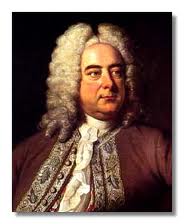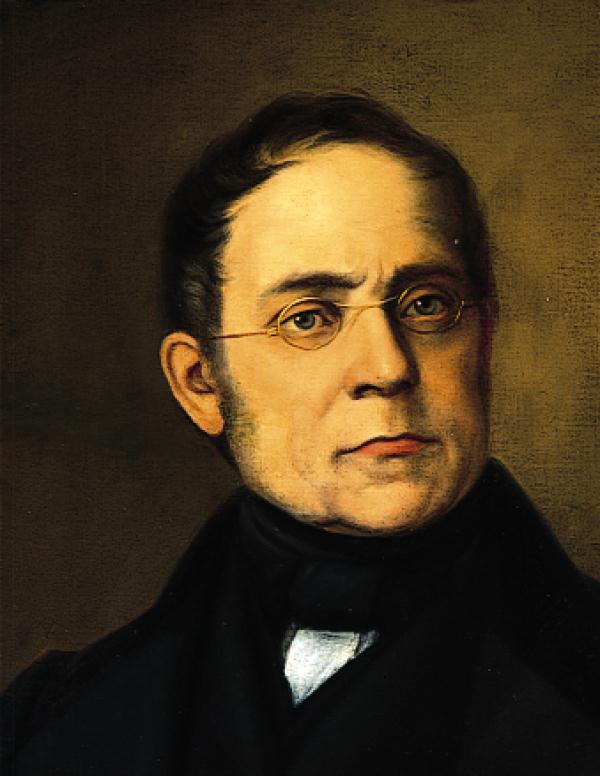February 20, 2012. George Frideric Handel and Carl Czerny. We celebrate Handel’s birthday (he was born on February 23, 1685 in Halle) every year. It would been odd not to: he’s one of the pillars of classical music. This time we’ll be brief: here is his Concerto Grosso in a minor, op. 6, no. 4. It is performed by Baroque Band, a Chicago-based ensemble. David Schrader, who among other things is the ensemble’s harpsichordist writes, "Johann Sebastian Bach and George Frideric Handel both made use of a synthesis of the French and the Italian styles – in fact, this synthesis is a characteristic of the Germans of the baroque era. Added to the native German musical language's innate richness of harmony and counterpoint, it literally defines the styles of these two giants of the late baroque. While Handel used French dance types in his music for the theatre, in this concerto we hear mostly the legacy of Corelli, whom Handel had met and worked with when in Rome in the early years of the eighteenth century. The work was finished on the eighth of October of 1739 and was printed by subscription – the subscribers included members of the royal family and many prominent members of the English nobility. The concertos of op. 6 are considered to be among the finest of eighteenth-century ensemble music, on a par with the Brandenburg Concertos of Bach. Like the Brandenburgs, the concertos of op. 6 are so diverse in plan as to resist any pattern except that of extremely high quality."
We’d also like to mention a musician of much more modest talent – Carl Czerny. He was born on February 21, 1791. Probably not a single pianist, whether amateur or professional, has managed to avoid playing some of Czerny’s etudes. This is his legacy, even though he wrote a huge amount of other music, including masses, symphonies, sonatas, and quartets. Practically none of it can be heard these days. Czerny had great teachers: Clementi, Hummel, Salieri and Beethoven and became a famous piano teacher himself. His most celebrated pupil was Franz Liszt, as well as Liszt’s rival Sigismond Thalberg, Theodor Leschetizky, and many others. Through their own pupils they continued this celebrated musical linage till this day. Here’s Etude no.16 in G major from Czerny’s Op. 299, the School of Velocity. It’s performed by Canadian pianist David-Michael Dunbar.
Handel and Czerny 2012
February 20, 2012. George Frideric Handel and Carl Czerny. We celebrate Handel’s birthday (he was born on February 23, 1685 in Halle) every year. It would been odd not to: he’s one of the pillars of classical music. This time we’ll be brief: here is his Concerto Grosso in a minor, op. 6, no. 4. It is performed by Baroque Band, a Chicago-based ensemble. David Schrader, who among other things is the ensemble’s harpsichordist writes, "Johann Sebastian Bach and George Frideric Handel both made use of a synthesis of the French and the Italian styles – in fact, this synthesis is a characteristic of the Germans of the baroque era. Added to the native German musical language's innate richness of harmony and counterpoint, it literally defines the styles of these two giants of the late baroque. While Handel used French dance types in his music for the theatre, in this concerto we hear mostly the legacy of Corelli, whom Handel had met and worked with when in Rome in the early years of the eighteenth century. The work was finished on the eighth of October of 1739 and was printed by subscription – the subscribers included members of the royal family and many prominent members of the English nobility. The concertos of op. 6 are considered to be among the finest of eighteenth-century ensemble music, on a par with the Brandenburg Concertos of Bach. Like the Brandenburgs, the concertos of op. 6 are so diverse in plan as to resist any pattern except that of extremely high quality."
not to: he’s one of the pillars of classical music. This time we’ll be brief: here is his Concerto Grosso in a minor, op. 6, no. 4. It is performed by Baroque Band, a Chicago-based ensemble. David Schrader, who among other things is the ensemble’s harpsichordist writes, "Johann Sebastian Bach and George Frideric Handel both made use of a synthesis of the French and the Italian styles – in fact, this synthesis is a characteristic of the Germans of the baroque era. Added to the native German musical language's innate richness of harmony and counterpoint, it literally defines the styles of these two giants of the late baroque. While Handel used French dance types in his music for the theatre, in this concerto we hear mostly the legacy of Corelli, whom Handel had met and worked with when in Rome in the early years of the eighteenth century. The work was finished on the eighth of October of 1739 and was printed by subscription – the subscribers included members of the royal family and many prominent members of the English nobility. The concertos of op. 6 are considered to be among the finest of eighteenth-century ensemble music, on a par with the Brandenburg Concertos of Bach. Like the Brandenburgs, the concertos of op. 6 are so diverse in plan as to resist any pattern except that of extremely high quality."
We’d also like to mention a musician of much more modest talent – Carl Czerny. He was born on February 21, 1791. Probably not a single pianist, whether amateur or professional, has managed to avoid playing some of Czerny’s etudes. This is his legacy, even though he wrote a huge amount of other music, including masses, symphonies, sonatas, and quartets. Practically none of it can be heard these days. Czerny had great teachers: Clementi, Hummel, Salieri and Beethoven and became a famous piano teacher himself. His most celebrated pupil was Franz Liszt, as well as Liszt’s rival Sigismond Thalberg, Theodor Leschetizky, and many others. Through their own pupils they continued this celebrated musical linage till this day. Here’s Etude no.16 in G major from Czerny’s Op. 299, the School of Velocity. It’s performed by Canadian pianist David-Michael Dunbar.
wrote a huge amount of other music, including masses, symphonies, sonatas, and quartets. Practically none of it can be heard these days. Czerny had great teachers: Clementi, Hummel, Salieri and Beethoven and became a famous piano teacher himself. His most celebrated pupil was Franz Liszt, as well as Liszt’s rival Sigismond Thalberg, Theodor Leschetizky, and many others. Through their own pupils they continued this celebrated musical linage till this day. Here’s Etude no.16 in G major from Czerny’s Op. 299, the School of Velocity. It’s performed by Canadian pianist David-Michael Dunbar.